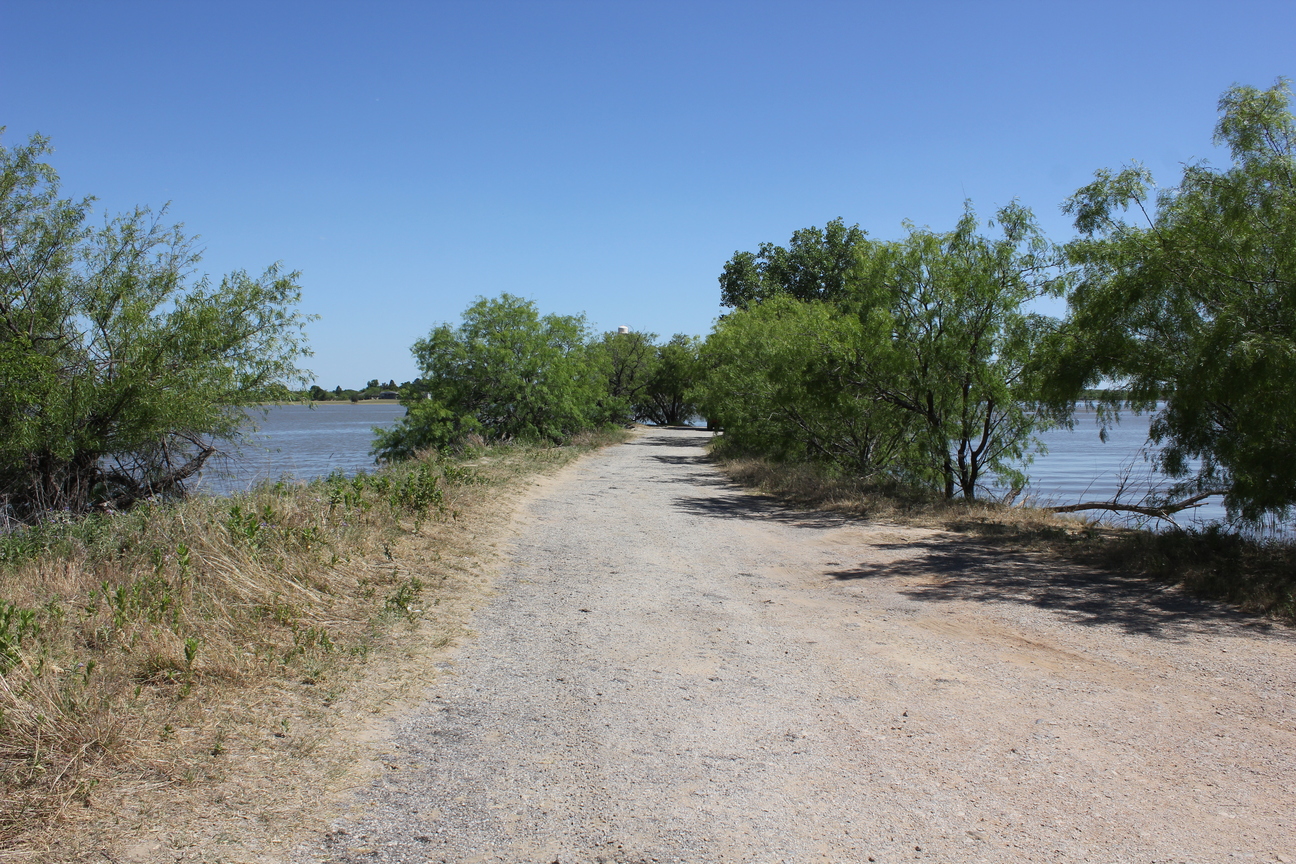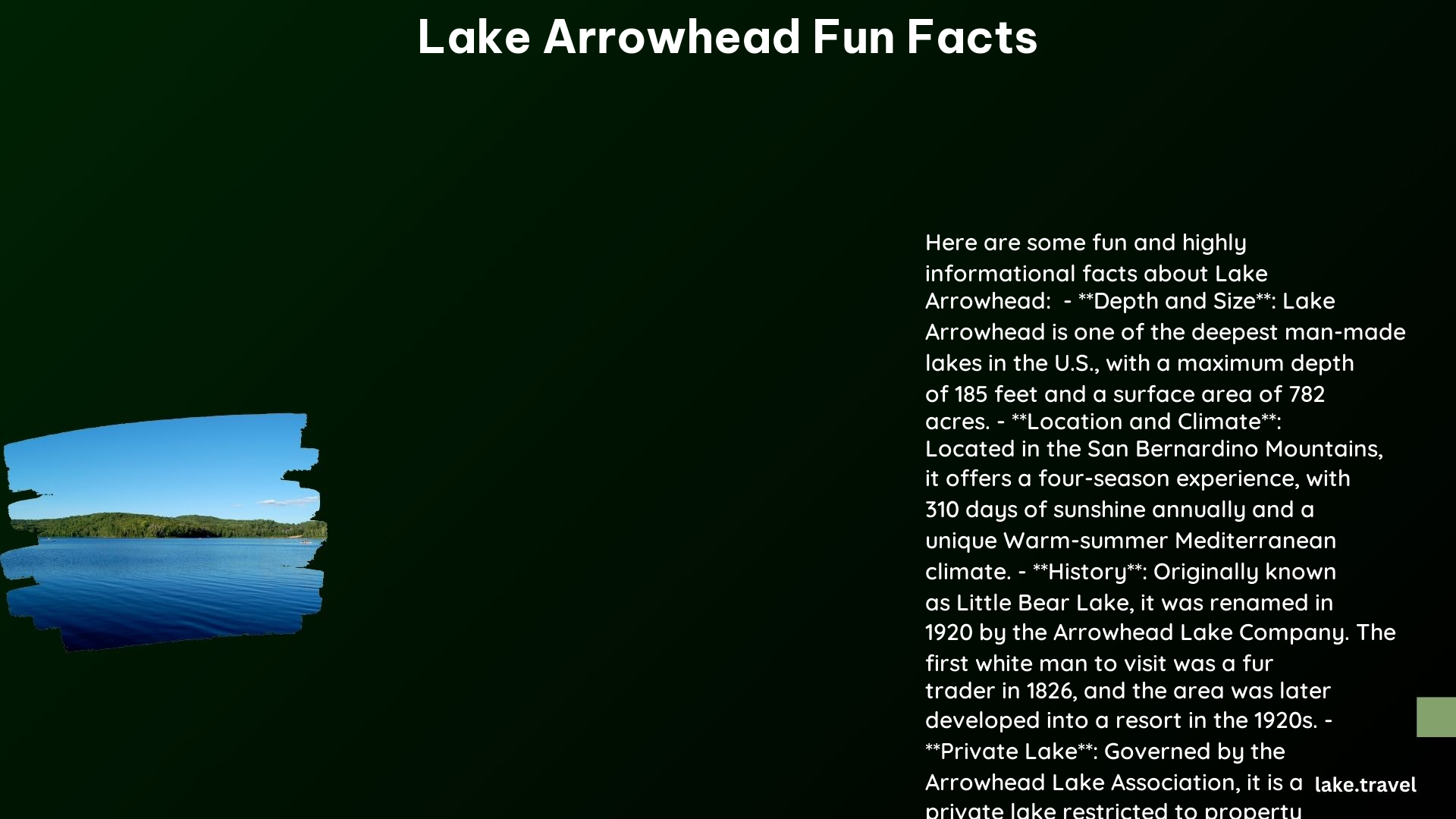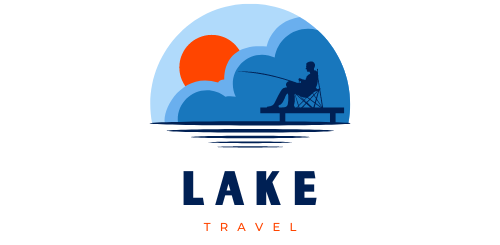Lake Arrowhead, a man-made gem nestled in the San Bernardino Mountains of California, boasts a rich history and unique features. From its Native American roots to its transformation into a popular resort destination, Lake Arrowhead offers a blend of natural beauty and human ingenuity. This article explores fascinating facts about the lake’s formation, wildlife, and recreational opportunities, providing insights into what makes Lake Arrowhead a truly special place.
What is the Origin of Lake Arrowhead?

Lake Arrowhead’s story begins long before its creation as a reservoir. The area, originally known as Little Bear Valley, has a history that spans centuries:
- Native American tribes, including the Paiute and Serrano, were the first inhabitants.
- In 1826, a fur trader associated with Jedediah Smith became the first white man to explore the area.
- Mormon settlers constructed the “Mormon Road” in 1852, facilitating trade and settlement.
- The 1860s saw the valley become a hub for logging and cattle raising.
The lake itself came into existence through a series of business ventures:
- In 1891, Ohio businessmen purchased land to build a reservoir and dam.
- The Arrowhead Reservoir Company began construction in 1893.
- In 1905, the Arrowhead Reservoir and Power Company took over the project.
- State legislation halted the power generation plans in 1921.
- The Arrowhead Lake Company acquired the property in 1920, transforming it into a resort.
How Was Lake Arrowhead Formed?

The creation of Lake Arrowhead is a testament to human engineering:
- It’s an artificial lake formed by the construction of a dam.
- The dam is a semi-hydraulic fill structure with impressive dimensions:
- Height: 200 feet
- Length: 720 feet
- Base thickness: 1,100 feet
- A steel-reinforced concrete core wall is embedded 20 feet into bedrock.
- The lake sits at an elevation of 5,000 feet in the San Bernardino Mountains.
What Unique Geographical Features Surround Lake Arrowhead?
The area around Lake Arrowhead boasts several distinctive features:
- The Arrowhead: A natural rock formation shaped like an arrowhead on the face of the San Bernardino Mountain near Arrowhead Hot Springs.
- San Bernardino Mountains: Provide a picturesque backdrop and diverse ecosystems.
- Papoose Lake: A smaller lake created downstream in the 1970s due to safety concerns.
What Wildlife Can Be Found at Lake Arrowhead?
Lake Arrowhead and its surroundings are home to a diverse array of wildlife:
Land Animals
- Mule deer
- Bobcats
- Coyotes
Birds
- Eagles
- Hawks
- Owls
Fish
- Trout
- Bass
- Catfish
The lake is regularly stocked to support recreational fishing activities.
What Outdoor Activities Are Available at Lake Arrowhead?
Lake Arrowhead offers a wide range of outdoor activities for visitors:
Hiking
- Numerous trails in the surrounding San Bernardino National Forest
- Access to parts of the Pacific Crest Trail
- Year-round availability, with some seasonal closures due to snow
Fishing
- Available in Lake Arrowhead and nearby streams
- Requires a California fishing license
- Seasonal regulations and fish stocking programs
Boating
- Private boat launches (permit required)
- Boat rentals available
- Typically open from spring to fall, weather permitting
What Amenities and Regulations Should Visitors Be Aware Of?
When visiting Lake Arrowhead, keep in mind the following:
Amenities
- Ample parking facilities around the lake
- Accessibility options for people with disabilities (check specific locations)
Regulations
- Fishing: Follow California Department of Fish and Wildlife guidelines
- Boating: Adhere to Lake Arrowhead-specific rules, including speed limits
- Environmental: Respect nature, proper waste disposal, and wildlife protection
What Historical Events Shaped Lake Arrowhead?
Several key events have influenced Lake Arrowhead’s development:
- 1826: First exploration by white settlers
- 1852: Construction of the “Mormon Road”
- 1891: Initial purchase of land for reservoir development
- 1920: Transformation into a resort community
- World War II: Lake Arrowhead Village became a retreat for servicemen
- 1970s: Construction of a new earthfill dam and creation of Papoose Lake
How Has Lake Arrowhead Evolved Over Time?
Lake Arrowhead’s transformation from a Native American territory to a popular resort destination showcases its rich history:
| Era | Key Developments |
|---|---|
| Pre-1800s | Native American inhabitation |
| Early 1800s | Exploration by fur traders |
| Mid-1800s | Mormon settlement and road construction |
| Late 1800s | Logging and cattle industry growth |
| Early 1900s | Dam construction and reservoir plans |
| 1920s | Resort community development |
| WWII | Sanctuary for servicemen |
| 1970s | Safety improvements and additional lake creation |
| Present | Popular tourist destination with diverse activities |
Lake Arrowhead continues to be a beloved destination, offering a unique blend of natural beauty, recreational opportunities, and historical significance. Its evolution from a Native American homeland to a modern resort area reflects the changing face of California and the enduring appeal of its mountain landscapes.
References:
1. Lake Arrowhead News
2. Kiwi Docks
3. Home is at the Lake
